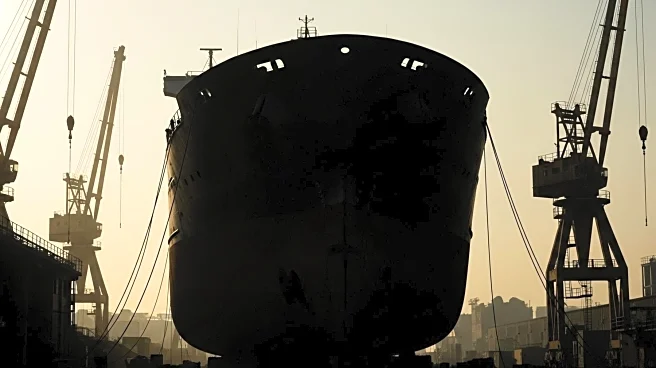What's Happening?
The ship recycling industry is experiencing a slowdown as global markets show signs of hesitancy. According to GMS, a cash buyer, the market is characterized by cautious movements, with oil traders closely monitoring inventories and geopolitical developments. The Baltic Dry Index, a key indicator of shipping costs, closed at 2,025, marking its best performance in a month. However, the index's components reveal a mixed picture, with Panamaxes and Supramaxes performing well, while Capesizes struggle due to weak iron ore demand. The supply of ships for recycling has decreased, with fewer arrivals at Indian sub-continent ship recycling facilities. This is contrary to expectations of a surge in post-COVID overaged ships entering the market. Additionally, currency fluctuations in India, Pakistan, and Bangladesh are affecting steel prices and market dynamics.
Why It's Important?
The slowdown in ship recycling has significant implications for the global shipping and steel industries. A reduced supply of ships for recycling can lead to increased costs for steel production, as recycled steel is a key input. The hesitancy in global markets, reflected in cautious trading and currency fluctuations, indicates broader economic uncertainties that could impact international trade and shipping. Countries like India, Pakistan, and Bangladesh, which are major players in the ship recycling industry, may face economic challenges due to currency devaluation and stagnant market conditions. This situation could affect employment and economic growth in these regions, highlighting the interconnectedness of global markets.
What's Next?
The ship recycling industry may continue to face challenges if global market hesitancy persists. Stakeholders in the shipping and steel industries will likely monitor economic indicators and geopolitical developments closely. Potential policy responses from governments in India, Pakistan, and Bangladesh could aim to stabilize currencies and support the ship recycling sector. Additionally, any shifts in global trade patterns or economic recovery could influence the supply and demand dynamics in the ship recycling market.
Beyond the Headlines
The current slowdown in ship recycling may prompt a reevaluation of industry practices and strategies. Companies might explore more sustainable and efficient recycling methods to adapt to changing market conditions. The situation also underscores the importance of diversifying economic activities in regions heavily reliant on ship recycling, to mitigate the impact of market fluctuations.









